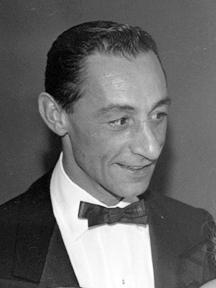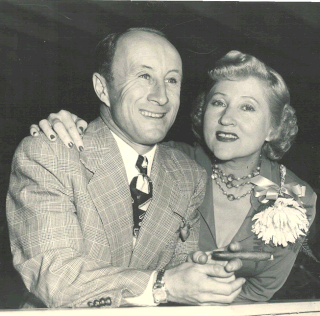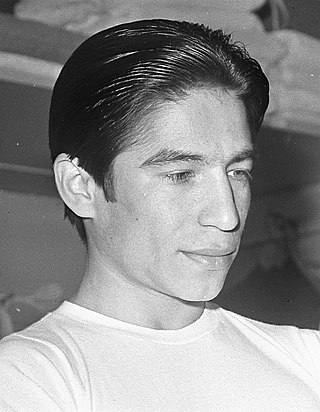Ronald Joseph Morel Turcotte, CM ONB (born July 22, 1941) is a retired Canadian thoroughbred race horse jockey best known as the rider of Secretariat, winner of the U.S. Triple Crown in 1973.
Ronald Joseph Morel Turcotte, CM ONB (born July 22, 1941) is a retired Canadian thoroughbred race horse jockey best known as the rider of Secretariat, winner of the U.S. Triple Crown in 1973.
Turcotte began his career in Toronto as a hot walker for E. P. Taylor's Windfields Farm in 1960, but he was soon wearing the silks and winning races. As an apprentice jockey he rode Windfields' Northern Dancer to his first victory. He gained prominence with his victory aboard Tom Rolfe in the 1965 Preakness Stakes. [1]
Turcotte soon started working with Canadian trainer Lucien Laurin at the racetrack in Laurel, Maryland.[ citation needed ]
In 1972 he rode Riva Ridge to victory in the Kentucky Derby and the Belmont Stakes. [2]
Turcotte became internationally famous in 1973 when he rode Secretariat to win the first Triple Crown in 25 years, with records for each race, and the phenomenal finish of Secretariat 31 lengths ahead of the field in the Belmont. A photograph of Secretariat winning the race, with Turcotte looking over his shoulder at the pack, far behind, became famous. Turcotte was North America's leading stakes-winning jockey in 1972 and 1973. He became the first jockey to win back-to-back Kentucky Derbies since Jimmy Winkfield in 1902 and was the first jockey to ever have won five of six consecutive Triple Crown races (matched in 2015 by Victor Espinoza). [3]
He was voted the prestigious George Woolf Memorial Jockey Award that honors a rider whose career and personal conduct exemplifies the very best example of participants in the sport of thoroughbred racing. He is the first person from Thoroughbred racing ever to be appointed a member of the Order of Canada. [4]
Turcotte's career ended on July 13, 1978. He fell from his horse, Flag of Leyte Gulf, during the 8th race at Belmont Park. He suffered injuries that resulted in his being a paraplegic. [5] [6]
He was inducted into the National Museum of Racing and Hall of Fame in 1979. He was voted into the New Brunswick Sports Hall of Fame and in 1980 was inducted into Canada's Sports Hall of Fame. In 1984 he became the first ever recipient of the Avelino Gomez Memorial Award given annually to the jockey who is Canadian-born, Canadian-raised, or a regular in the country, who has made significant contributions to the sport. [7]
In 2015, a statue of Secretariat and Turcotte crossing the finish line at the Belmont Stakes was unveiled in Turcotte's hometown of Grand Falls, New Brunswick. [8]
Born in Drummond, New Brunswick, Turcotte was one of 12 children. He left school at age 14 to work with his father as a lumberjack, then at age 18, headed to Toronto looking for construction work. [9]
Turcotte now lives in his home town of Grand Falls, New Brunswick, Canada, with his wife Gaëtane and their four daughters. He is an advocate for those with disabilities and helps to raise funds for disability programs. [10]
A well-known survivor of an on-track accident, Turcotte makes appearances at racetracks to raise funds and awareness of the assistance that the Permanently Disabled Jockeys Fund (PDJF) provides to fellow injured riders. [11]
Turcotte was hospitalized on March 9, 2015, following a single-vehicle accident in New Brunswick. The van he was driving flipped after hitting a snowbank. Turcotte and a friend were both injured in the accident. [12] Turcotte sustained fractures to both legs, while his friend suffered minor injuries. [13]
In the 2010 Disney movie Secretariat, Ron Turcotte's role as Secretariat's jockey is played by Otto Thorwarth, a real life jockey himself. [14]
Directed by Phil Comeau, a National Film Board of Canada documentary feature film on Ron Turcotte's life and career, Secretariat's Jockey, Ron Turcotte, had its world premiere in Louisville, Kentucky, in May 2013. [15]

Secretariat, also known as Big Red, was a champion American thoroughbred racehorse who was the ninth winner of the American Triple Crown, setting and still holding the fastest time record in all three of its constituent races. He is widely considered to be the greatest racehorse of all time. He became the first Triple Crown winner in 25 years and his record-breaking victory in the Belmont Stakes, which he won by 31 lengths, is often considered the greatest race ever run by a thoroughbred racehorse. During his racing career, he won five Eclipse Awards, including Horse of the Year honors at ages two and three. He was nominated to the National Museum of Racing and Hall of Fame in 1974. In the Blood-Horse magazine List of the Top 100 U.S. Racehorses of the 20th Century, Secretariat was second to Man o' War.

Northern Dancer was a Thoroughbred that, in 1964, became the first Canadian-bred horse to win the Kentucky Derby. After being retired from racing, he became one of the most successful sires of the 20th century. He is considered a Canadian icon and was inducted into the Canadian Sports Hall of Fame in 1965. Induction into the Racing Hall of Fame in both Canada and the United States followed in 1976. As a competitor, The Blood-Horse ranked him as one of the top 100 U.S. Thoroughbred racehorses of the 20th century. As a sire of sires, his influence on the breed is still felt worldwide.

George Edward Arcaro was an American Thoroughbred horse racing Hall of Fame jockey who won more American classic races than any other jockey in history and is the only rider to have won the U.S. Triple Crown twice. He is widely regarded as one of the greatest jockeys in the history of American Thoroughbred horse racing. Arcaro was born in Cincinnati, Ohio, the son of an impoverished taxi driver. His parents, Pasquale and Josephine, were Italian immigrants and his father held a number of jobs, including taxi driver and operator of an illegal liquor enterprise during Prohibition. Arcaro was born prematurely, and weighed just three pounds at birth; because of this, he was smaller than his classmates and was rejected when he tried out for a spot on a baseball team. His full height would reach just five-foot, two inches. Eventually nicknamed "Banana Nose" by his confreres, Arcaro won his first race in 1932 at the Agua Caliente racetrack in Tijuana, Mexico; he was 16 years old. In 1934, the inaugural year of Narragansett Park, Arcaro was a comparative unknown who rode many of his early career races at 'Gansett.

Desmond Sandford "Sandy" Hawley, is a Canadian Hall of Fame jockey.
Lucien Laurin was a French-Canadian jockey and Hall of Fame Thoroughbred horse trainer. He was best known for training Secretariat, who won the Triple Crown in 1973.

Stewart Elliott is a Canadian jockey in thoroughbred horse racing.

James Stout was an American Hall of Fame thoroughbred horse racing jockey who won four Triple Crown races.

Laffit Alejandro Pincay Jr. is a retired Panamanian jockey who is known for once holding the all-time record for wins in horse racing, while still holding third place many years after his retirement. He competed primarily in the United States.
Edward Retz "Eddie" Maple is a retired American thoroughbred horse racing jockey. One of eight siblings, he is an older brother to jockey Sam Maple, who won more than 2,500 races.
Robert Nelson Ussery was an American Thoroughbred horse racing hall of fame jockey. His first race as a professional jockey came at Fair Grounds Race Course in New Orleans on November 22, 1951, where he rode Reticule to victory in the Thanksgiving Handicap. By the end of the decade, he had won the Travers, Whitney and Alabama Stakes.

John R. Velazquez is a Puerto Rican jockey in Thoroughbred horse racing. He began his career in Puerto Rico and moved to New York in 1990. In 2004 and 2005 he was the United States Champion Jockey by earnings and both years was given the Eclipse Award for Outstanding Jockey. He was inducted into the Horse Racing Hall of Fame in 2012, rode his 5,000th winner in 2013, and became the leading money-earning jockey in the history of the sport in 2014.
Riva Ridge was a Thoroughbred racehorse, the winner of the Kentucky Derby and Belmont Stakes in 1972.
Patrick Husbands is a Barbadian jockey in Thoroughbred horse racing. The son of a jockey, he began riding as a young boy, turning professional in his home country where he rode successfully until emigrating to Toronto, Ontario in 1994. In 1990 he became the youngest jockey to win the prestigious Barbados Gold Cup at just 16 years, 9 months on his mount Vardar.

The Coronation Futurity Stakes is a Thoroughbred horse race for 2-year-old horses foaled in Canada. It is run annually in mid-November at Woodbine Racetrack in Toronto, Ontario, Canada at a distance of 1+1⁄8 miles. Along with its turf counterpart, the Cup and Saucer Stakes, the Coronation Futurity is the richest race for two-year-olds foaled in Canada.
Alfred Masson Robertson was a Hall of Fame jockey in American Thoroughbred horse racing.

Victor Espinoza is a Mexican jockey in American Thoroughbred horse racing who won the Triple Crown in 2015 on American Pharoah. He began riding in his native Mexico and went on to compete at racetracks in California. He has won the Kentucky Derby three times, riding War Emblem in 2002, California Chrome in 2014, and American Pharoah in 2015. He also won the Preakness Stakes three times, in those same years and with the same horses. He was the first jockey in history to enter the Belmont Stakes with a third opportunity to win the Triple Crown; his 2015 victory made him the oldest jockey and first Hispanic jockey to accomplish the feat. He joined Ron Turcotte as the only jockeys to win five of the six jewels of the Triple Crown spread over two consecutive years.
Walter Blum was an American jockey who won 4,382 races in a 22-year career. Blum received the George Woolf Memorial Jockey Award for being the best jockey of 1964. He won the 1971 Belmont Stakes as the jockey of 34-1 long shot Pass Catcher, which prevented Canonero II from winning the Triple Crown. He was inducted into the International Jewish Sports Hall of Fame in 1986, and the following year into the United States Racing Hall of Fame.
Jean (John) B. LeBlanc is a Canadian retired jockey in Thoroughbred horse racing. He competed at many of the top racetracks in the United States but for most of his career was based in Ontario where he was commonly known as John, the English language translation for his name.
Frank Robinson was an American Champion Thoroughbred horse racing jockey.
James Dee "Jimmy" Nichols was an American Thoroughbred horse racing jockey and horseman who, after retiring from race-riding, played a key role in the two U.S. Triple Crown race wins of Risen Star.